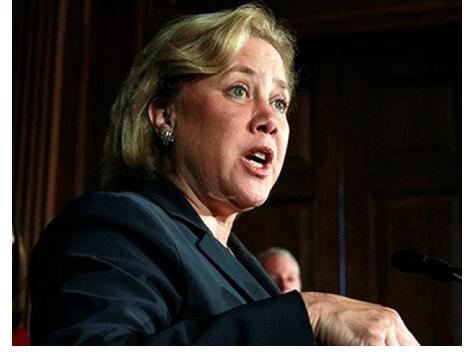Despite her campaign spokesman’s claim Thursday that “[w]e have not yet received any kind of request, and we expect the court to quickly dismiss this tired claim,” a team of high powered lawyers representing Senator Mary Landrieu (D-LA) responded on Wednesday in a formal pleading submitted to Judge Winston Fields, who is presiding over the lawsuit filed by State Representative Paul Hollis objecting to Landrieu’s candidacy last Friday.
Breitbart News reported earlier that the office of the Sheriff of the Parish of East Baton Rouge legally served Landrieu on Wednesday at 10:31 am, by personally delivering the subpoena requiring her attendance at a court hearing in Judge Fields’s Baton Rouge courtroom of the 19th Judicial District on Friday at 9 am to Doug Welborn, the Clerk of Court acting as her agent.
Breitbart News can now report that later on Wednesday Senator Landrieu’s attorneys, Antonio Clayton of the Port Allen, Louisiana law firm of Clayton and Fruge, and James M. Williams of the Metaire, Louisiana law firm of Gauthier, Houghtaling, and Williams, submitted a pleading in compliance with the subpoena that had been legally served on their client earlier in the day.
Since August 22, Mr. Williams has also represented “the eyewitness at the center of the investigation into the shooting of Michael Brown in Ferguson, Mo.”
In their pleading Landrieu’s attorneys asked the court to dismiss Hollis’s petition on the grounds that “Plaintiff fax filed a petition objecting to candidacy against Defendant Mary L. Landrieu . . . [o]n Friday August 29, 2014 at 4:39 pm.” However, they argued that “in accordance with Louisiana Revised Statute [Section] 18:493, Plaintiff’s petition needed to be filed no later than 4:30 pm on Friday August 29, 2014.”
Landrieu’s attorneys also argued that “[t]he First Circuit case of Strong v. Breaux is virtually identical to the matter at hand… In Strong, a voter filed suit challenging the candidacy of an incumbent United States Senator, John Breaux, who was seeking reelection. The plaintiff alleged that Breaux did not meet the requisite qualifications because he was not an inhabitant of Louisiana, he was an infrequent visitor to Louisiana, and that his home and residency was in Washington, D.C.”
“The First Circuit . . . [found],” Landrieu’s attorneys wrote, “that, under the United States Constitution Article 1, Section 3, clause 3 that there was no requirement that Breaux be an inhabitant at the time of qualifying.”
According to Landrieu’s attorneys, “The court stated, ‘We find no requirement therein that the candidate be an inhabitant of the state where he qualifies to run for office. Thus, we conclude the allegations concerning inhabitance cannot state a cause of action prior to the election.’ “
Landrieu_Attorneys_Pleading_9_3_14.pdf
Matthew Monson, attorney for the plaintiff in the case, State Representative Paul Hollis, filed an answer to Landrieu’s attorneys with the court on Thursday. In the answer, Monson argued that granting Landrieu’s request to dismiss Hollis’s case “would deprive him of his constitutionally-protected rights to due process and equal protection under the law.”
“In her exceptions,” Monson states, “Mary L. Landrieu makes two contradictory arguments. First, . . . [she] argues that Paul Hollis’ claims are prescribed as they were made after the alleged deadline of 4:30 pm on Friday, August 29, 2014. Second, [she] . . . alleges that Paul Hollis cannot proceed in this matter because allegations concerning inhabitancy cannot state a cause of action prior to an election.”
“Mary L. Landrieu,” Monson continues, “simultaneously argues that [Hollis’s] petition is filed both too early AND too late. Such arguments,” he concludes, “lead to a conclusion that produces an absurd result–that no Louisiana citizen, including Paul Hollis, can bring a qualifying challenge to the inhabitancy of a candidate for the United States Senate. Such a result violates Paul Hollis’ fundamental rights.”
Monson also addressed each of the two arguments for dismissal separately, noting first that “LA. R.S. 18-451 particularly states that ‘In the event that the qualifications for an office include a residency or domicile requirement, a candidate shall meet the established length of residency or domicile as of the date of the qualifying, notwithstanding any other provision of law to the contrary.’ (emphasis added) It is of note that the quoted language was added by the Louisiana Legislature to La. R.S. 18:451 by Act 172 of the 2001 Louisiana Legislative Session.”
The First Circuit Court ruled on the Strong v Breaux case cited in the pleading of Senator Landrieu’s attorneys in 1992, nine years before the law was changed.
Monson also addressed the claim by Landrieu’s attorneys that the lawsuit was filed nine minutes too late. “The record reflects,” Monson wrote, “that the Petition was attempted to be filed via facsimile on five (5) occasions prior to 4:30 pm, beginning at 4:13 p.m., on August 29, 2014. However, the facsimile machine of the 19th Judicial District was “busy” on three of these occasions and did not answer on two occasions. As a result, any alleged delay regarding the filing of the Petition Objecting to Candidacy is of no fault of Paul Hollis.”
Hollis_Attorney_Pleading_Response_9_4_14.pdf
One dramatic element of this story will unfold when the hearing on the Hollis lawsuit commences in Judge Fields’s courtroom at 9 am on Friday morning. Judge Fields and others in attendance will learn by her presence or absence whether Mary Landrieu has chosen to comply with his September 2 order requiring her to personally attend the hearing, or whether she has chosen to comply with the subpoena issued by the Clerk of Court and legally served on her September 3 that gave her the additional option of complying by the submission of a pleading.
A second dramatic element of the story–whether Judge Fields will decide to dismiss or continue the case–will not be known until the end of the hearing, at the earliest.

COMMENTS
Please let us know if you're having issues with commenting.